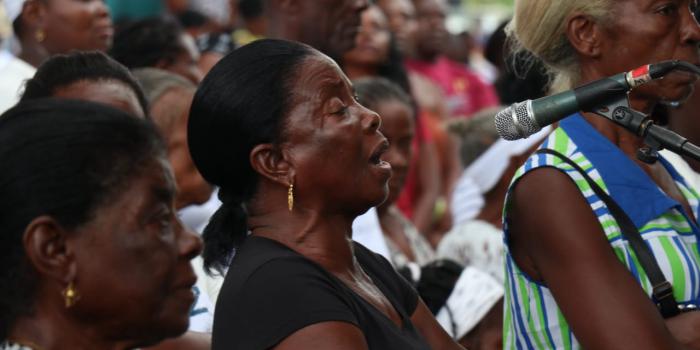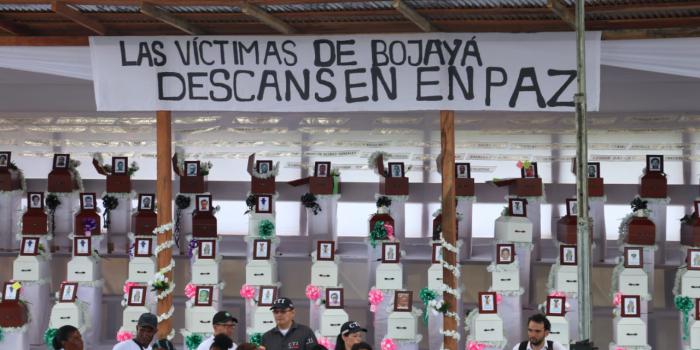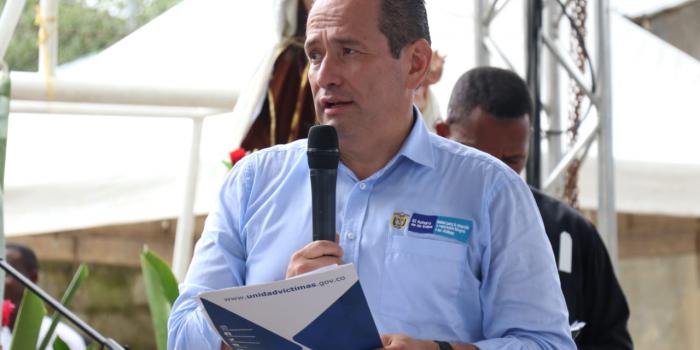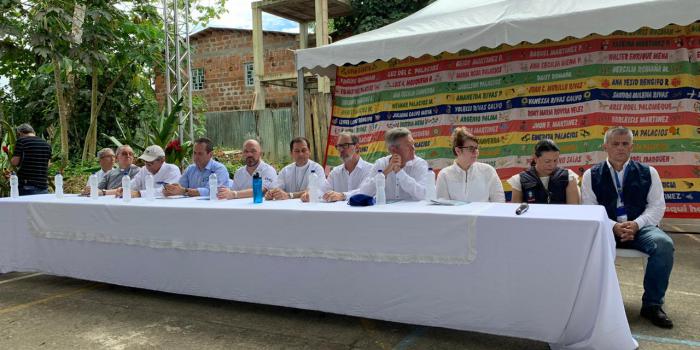
A call for peacebuilding resounded in Bojayá
The community, international organizations, and state institutions recognized that the entire process that concluded with the burial of the bodies of fatal victims of the massacre on May 2, 2002, was learning process, and that, articulating efforts they achieved satisfactory results. The community thanked the work and support of all entities and organizations.




"From Chocó to El Guaviare, from La Guajira to the jungle, people in Colombia want the end of this war to come," said one of the praises played by women from Bojayá during the ecumenical act that took place in the first morning hours on Sunday at the municipal capital's coliseum, known as the new Bellavista, because the old one was desolate with the massacre of May 2, 2002.
In a ceremony led by Monsignor Juan Carlos Barreto, bishop of the Diocese of Quibdó, capital of Chocó, Afro women interpreted Alabaos senses, in which he also stated that: “I want it to be heard everywhere… so that the pain of my people does not remain in oblivion “and they asked José Antonio de Padua and the Virgen del Carmen for the “peace we all dream about” because they insisted on their songs that “it has not yet come”.
However, all the people of Bojayá who took part in the event thanked the work done by the State institutions, international organizations and those of the community, which allowed to identify, farewell, and bury their loved ones according to their customs and beliefs.
Yuber Palacio Córdoba, a member of the Committee for the Rights of Victims of Bojayá , acknowledged that this has been a “concerted process with a broad participatory dynamic of families and communities” and highlighted the work that the Unit for Victims has been developing in the process of reparation of the three communities that are recognized in the Single Victims Registry as collective subjects in that region (Afro, Indigenous and 16 Community Councils).
Also, he thanked all institutions, both national and international organizations and people who participated in the process; in a special way he referred to the leadership of praise, prawns, jaibanas and ancestral guides who, with their prayers, songs, praises, güalis , chigüalos , "have allowed us a healing harmonization."
However, Yuber insisted that it is necessary to find 10 people considered missing and recognize the nine pregnant babies of expecting women who died in the violent events.
The work of the Unit
After the ecumenical act, pronouncements came from representatives of State entities and other organizations. Ramón Rodríguez, general director of the Unit for Victims, recapped that this act was a commitment of the entity, and stated: “we are proud to be here, to facilitate this final burial under their customs and practices, after having also done a long psychosocial work; we are flipping the page of this chapter that should never have happened, we will continue working, focused on processes of genuine peace, genuine reconciliation, that everyone can farewell their loved ones.”
The official acknowledged that "there is also a chapter to close, which is that of those who are missing" and invited the State entities to work in an articulated way: "We have to work for the missing ones, work together, share information without prevention, at the Unit there are 280 thousand archive boxes, which are history of the conflict, they are memory”.
Likewise, the director general of the Unit expressed a commitment to “continue responding to humanitarian emergencies, without ignoring everything that has been happening in the territory, and continue with both collective and individual reparation processes”.
In an interview parallel to the event, the entity's technical director of Repair, Enrique Ardila, explained the work of the Unit in this process: “We have provided psychosocial support since the Attorney General's Office began its work, we have also guaranteed all the logistics from the moment Legal Medicine delivered the bodies, so that today more than 600 families could make a presence, we have guaranteed that they meet in community food pots, their transportation and accommodation.” In these actions, the entity invested around $ 2,000 million.
Fear is still round
Since the acts of arrival of the bodies to Bojayá began, the community has expressed emotion for being able to farewell their loved ones, sadness because they should not have died that way, uneasiness because illegal armed groups have returned to make a presence in their territory, and uncertainty about what the State can do to continue improving their living conditions and not allowing the presence of the ELN guerrillas and the Clan del Golfo or Gaitanista Self-Defense Groups in the region.
Leiner Palacios, community leader, who lost 32 relatives in the massacre, said it in several sentences, including the following: "It is complex to be here today, it was very hard to achieve this moment"; "Hopefully the next act will be to build confidence in the State, but how to get to trust when violence returns and repeats itself"; “We are facing the dead, but also facing the fear of what is happening today. Another massacre is possible”; “It is better peace that can be imperfect that to keep burying dead people. I invite the international community to keep that surveillance of human rights here. ”
Father Francisco De Roux, president of the Truth Commission, joined in part to that call; He recalled that, although that entity is state-owned, it is totally independent and drew attention to what has happened historically in Chocó: “Wasn't it due to the greed for products, for their strength, those that led Colombia to say, let's go for El Chocó and there we go with our mining, industrial products, because what rights do these blacks and those indians have? I want us to ask ourselves why, the Church and the communities are right when they say that the State, if it does not realize what is happening, this will continue. ”
Hope and example of bojayaseños
All people who spoke on behalf of national and international entities highlighted the resilience of people from Bojayá and their capacity for forgiveness and the search for reconciliation.
Lina María Foronda Hernández, a prosecutor who has worked on this process of research and search for the remains, said that “this town has taught us resistance, tenacity, union, commitment, strength, empathy, passion, respect for traditions, thanks, and above all, forgiveness and reconciliation, which is the most important thing for a community to succeed. ”
Alberto Brunori, delegate in Colombia of the United Nations High Commissioner for Human Rights, said: “A central message is that this sacrifice of the Bojayaseños was not in in vain, this shall not be repeated, peace is the only alternative, there is no step backwards.
Quebin Mejía Muñoz, director of the northwestern region of the National Institute of Legal Medicine, which covers Chocó, Córdoba and Antioquia, said that during the body identification work they learned to work based on the needs of the other, in this case the community of Bojayá .
Ruben Dario Acevedo, general director of the National Center for Historical Memory, highlighted the role of memory and history played by the Alabaos and other traditions of the community and recalled what has been done since 2008 by the entity.
The awards also came from the ambassadors of Norway, Sweden, and France.
This week the novena continues, there are nine nights of traditional rites for the victims of the Bojayá massacre and there will also be planting of a tree for each person who died in that tragic event.
(End/JPV/DRR)






